Albanese’s three fudges on China yield nothing — and weaken us
The price Australia pays for Anthony Albanese’s stabilised engagement with communist China – with the mantra ‘co-operate, disagree, engage’ – is that all substance is drained from the relationship.
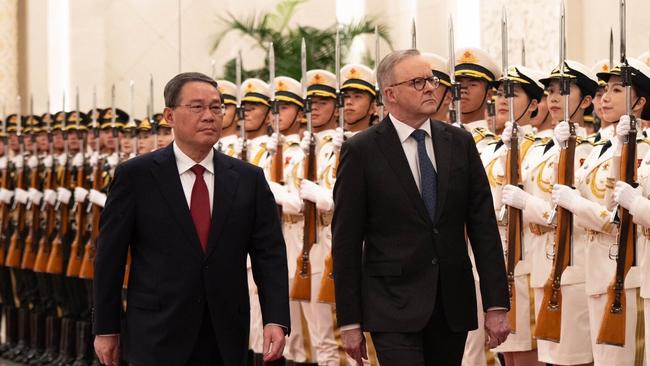
Albanese’s article did not touch on China’s military threats against Taiwan. He raised no issues about Chinese cyber malware planted into Australian critical infrastructure. He said nothing about China’s relentless intellectual property theft, about unprecedented levels of espionage, about threats and bullying of Chinese Australians, or about attempts to bribe Australian politicians.
The most pointed reference in his article was to “how we firmly and calmly call out unacceptable risks to Australian naval personnel on duty in international waters”.
This coded language referred to one of several incidents where Chinese ships and aircraft have endangered the lives of Australian Defence Force sailors and aviators.
Albanese avoided raising with Chinese President Xi Jinping the Chinese sonar attack on divers from the frigate HMAS Toowoomba last November. The Prime Minister dodged the opportunity at the Asia-Pacific Economic Co-operation summit in San Francisco.
The US Defence Department has identified more than 200 Chinese attacks on ships and aircraft in the East and South China seas since 2021. Failing to raise this at the right political levels ensures that such highly risky behaviour will continue.
The attack on the Toowoomba should be high on Albanese’s list to raise this weekend with visiting Chinese Premier Li Qiang. It’s unlikely Albanese will mention it. He has created his own excuse for not doing so: “The true measure of foreign policy strength is the ability to effectively manage differences, not manufacture confrontations.”
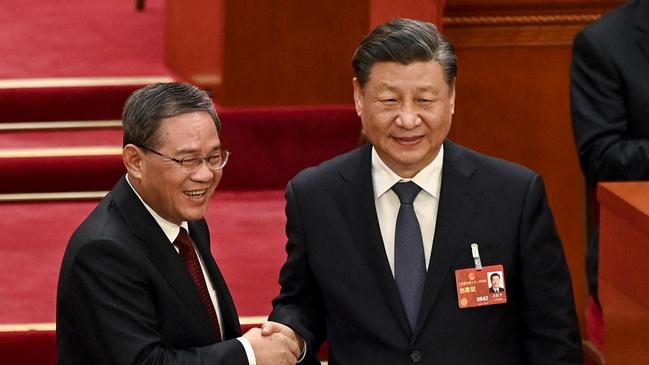
Complaining about Chinese attacks on ADF personnel is manufacturing a confrontation? Albanese is channelling the Chinese Communist Party’s talking point that everything negative in the relationship is Australia’s fault.
We are left with the one vacuous observation on China that the Prime Minister has used on dozens of occasions since the 2022 election: “co-operate with China where we can, disagree where we must, and engage in our national interest”. Albanese deploys this line in speeches, at media conferences, during parliament’s question time, in his interactions with Chinese and other world leaders.
It is as though the line is the only thing he can remember about the relationship.
The Prime Minister has had the benefit of sitting for two years in the national security committee of cabinet and has daily access to some of the best intelligence analysis in the world from the Office of National Intelligence. Has he truly learned nothing new to think or say about China over this time?
The “co-operate, disagree, engage” mantra is the tactic Albanese uses to avoid substance. In language Beijing might adopt, these are the “three fudges”.
Is there a problem with Beijing’s espionage? Is Albanese concerned about China’s use of secret police officers in Australia to threaten ethnic-Chinese people? Is he outraged that China is trying to subvert neighbouring Pacific Islands leaders or is undermining Australia’s reputation in Asia by lying about the nuclear weapons proliferation “risk” from AUKUS?
On these issues one can expect no substance from him or his government. Instead he talks non-specifically about “co-operate, disagree, engage”.
In practical terms, the Albanese approach has yielded nothing of substance.
It is clear that Beijing was glad to see the back of Scott Morrison. Xi hated Morrison’s call to investigate the origins of Covid-19 because, as is becoming increasingly clear, that would reveal a laboratory leak from the Wuhan Institute of Virology.
Beijing also was genuinely disturbed by Morrison’s ability to produce AUKUS, working with US President Joe Biden and British prime minister Boris Johnson. This somewhat unlikely trio produced one of the most useful mechanisms to push back against Chinese militarism.
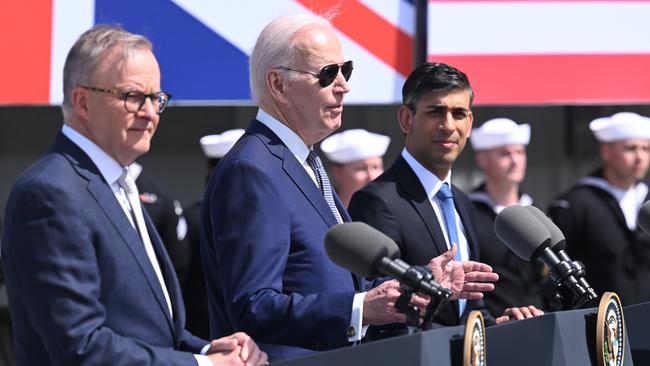
China’s leaders would have been happy at the arrival of Albanese. But it is wrong to claim the thawing in bilateral relations was the result of Labor’s “patient, calibrated and deliberate efforts of our government to rebuild dialogue with China”.
Recall the “14 grievances” statement written by the Chinese embassy and handed to journalists in November 2020?
That statement attacked the modest but necessary steps taken by Australian governments to limit China’s influencing of politicians with financial payments; excluding Huawei from the 5G rollout; and making “a statement on the South China Sea to the United Nations”. The Chinese grievance list attacked the government for “providing funding to anti-China think tank” the Australian Strategic Policy Institute, an organisation I then led. ASPI’s crime was “peddling lies around Xinjiang and so-called China infiltration”.
Some of my staff at ASPI paid a heavy price at the time, subjected to appallingly abusive and co-ordinated attacks on social media. Family of ASPI staff in China came under direct duress from police and security.
China’s new ambassador to Australia in January 2022, Xiao Qian, cranked back the angry rhetoric. This quieter approach was also happening in Europe and the US. By the time of Albanese’s election, Beijing had partially shelved the wolf warrior diplomacy that had done so much to damage China’s international reputation.
In January last year its lead exponent of wolf warrior diplomacy, Zhao Lijian, was quietly removed from his job as a spokesperson for China’s Foreign Ministry to become a deputy in the Department of Boundary and Ocean Affairs.
The Prime Minister can fool himself that the less offensive Chinese diplomacy is the result “of the benefits we have been able to secure through dialogue”. A more accurate assessment is that China shelved the wolf warrior nonsense because Beijing realised it was doing harm. The resumption of dialogue under Labor happened precisely because it has no substance. China has not changed its strategic behaviour in any way and actually has become more militarily aggressive. Beijing gets a more quiescent Canberra because Albanese is desperate for the fiction of the stabilised relationship.
Concerns about China’s aggression towards Taiwan, Japan, The Philippines, the Pacific Islands and Australia will not be put to Premier Li. What we know in advance of his visit is that Li will attend some “cultural” events primarily for the benefit of Chinese media.
So-called patriotic supporters – mainland Chinese students – will be paid and organised by the Chinese embassy to surround visit venues such as Parliament House. Protesters will be kept away and airbrushed out of Chinese media reporting. Australian media will not be allowed to put questions to Li, nor will there by any opportunity to cover the substance when the leaders “exchange views on bilateral, regional and international issues”.
We know from Albanese’s trip to Beijing in November that pandas were front and centre of the talks. The Prime Minister declared himself to be “pro-panda”, said he thought (twice, in fact) they were “wonderful animals” and Xi “reminded us of the fact that not all pandas are cute, by relaying the Kung Fu Panda story”.
To help address the likely absence of policy substance, I offer here my own 14 demands on the People’s Republic of China. Consider these the “14 stops” that Albanese should be prepared to put to Premier Li.
First, China should stop using potential lethal force against ships and aircraft of the Australian Defence Force and our friends and allies operating legally in international waters.
With hundreds of such incidents recorded it is inevitable that people are going to be killed by Chinese aggression. If one sailor or aviator tragically killed is Australian, what then for the stabilised relationship?
The risk of Chinese malware being implanted into critical infrastructure – the electricity grid, for example – is one increasingly concerning US officials.
Without mentioning China, ASIO director-general Mike Burgess warned in February: “ASIO is aware of one nation-state conducting multiple attempts to scan critical infrastructure in Australia and other countries, targeting water, transport and energy networks.”
Burgess didn’t mention China but readers can be assured that the threat does not come from New Zealand.
On the demand to stop bribing Australian politicians, recall Labor senator Sam Dastyari resigning his Senate seat in December 2017 over comments made to Chinese media that “the South China Sea is China’s own affair”. That followed an offer of a $400,000 payment to Labor – one that did not eventuate.
Millions of dollars from Chinese mystery businessmen were donated to political parties in the previous decade. As recently as this year Burgess has spoken at length of politicians being compromised by a “foreign regime”.
My 14-point list is hardly exhaustive. All points address Chinese activities that are thoroughly publicly reported. Most describe forms of behaviour that Beijing pursues in several countries, not just Australia.
The Australian government should find ways to raise these 14 points, not “to manufacture confrontation” but to make it clear that it is impossible to have a normal relationship when Beijing is relentlessly focused on undermining Australian sovereignty.
More likely, though, we will just have more pro-panda diplomacy. While Adelaide Zoo is being allowed to keep its two giant pandas, reports say they will be replaced by a new pair: at age 18 and 17 Wang Wang and Fu Ni are reaching their natural life expectancy. They are actually here on a loan agreement for which the zoo pays China $1m a year. Thanks for the memories, Beijing.
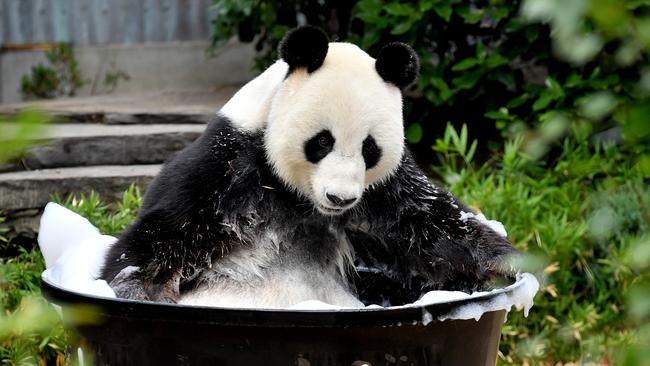
Until such time as China can manage a respectful relationship with Australia, or until we can handle ties with a hint of backbone, it would be best for our national security and self-respect that Premier Li return home and take his pandas with him.
Peter Jennings is director of Strategic Analysis Australia and was executive director of the Australian Strategic Policy Institute from 2012 to 2022. He is a former deputy secretary for strategy in the Defence Department (2009-12).



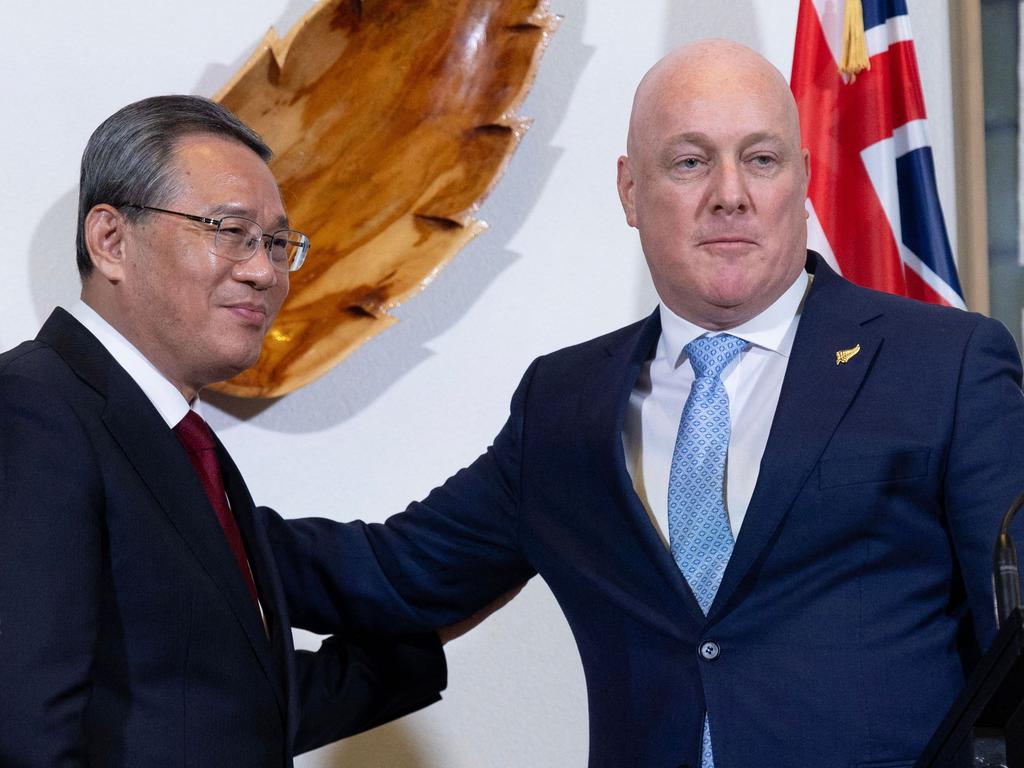


The price Australia pays for Anthony Albanese’s stabilised engagement with communist China is that all substance is drained from the relationship. That’s why the most concrete aim mentioned by the Prime Minister in his commentary piece in The Australian last Wednesday was to “see further progress for our shellfish exporters”. He has nothing to say about Beijing’s open challenge to regional security.